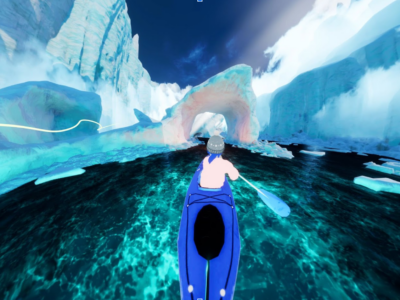
Yutian Wu, an atmospheric scientist seeking to understand how the rapid decline of Arctic sea ice will impact North American weather extremes, is the Center for Climate and Life’s newest Fellow.
Launched in 2016, the Center for Climate and Life Fellows Program funds research that explores how changes in climate and life systems will impact the essentials of human sustainability: food, water, shelter, energy, and health.
“The Fellows Program fuels scientific progress by enabling exceptional scientists to put their bold ideas into action,” Peter de Menocal, director of the Center for Climate and Life, said. “Their research is yielding fundamental new knowledge that moves us toward viable, sustainable solutions to the impacts of climate change. We are especially grateful to the George and Wendy David Fund for generously supporting this fellowship position.”
Wu joined Lamont-Doherty Earth Observatory’s Division of Ocean and Climate Physics as a Lamont Assistant Research Professor in 2017. She studies the general circulation of the atmosphere, including jet streams, storm tracks, and monsoon circulation, using observations and numerical model simulations. Wu is the recipient of a prestigious National Science Foundation CAREER award, a five-year grant given to early-career researchers whose integration of research and education poises them to become a leader in their field.
Vanishing Arctic Sea Ice and Extreme Weather
Climate change is warming the Arctic twice as fast as the rest of the planet. As a result, sea ice is now disappearing at a rate of 13.2 percent each decade. NOAA’s 2017 Arctic Report Card, which keeps track of changes at the top of the world, concluded that the extent and rate of sea ice decline in the Arctic is “unprecedented in at least the last 1,500 years and likely much longer.”
The changes are worrisome for many reasons. Among them is growing scientific evidence that vanishing sea ice can increase the frequency of extreme weather events at lower latitudes by disrupting the jet stream, which controls and creates our weather. The result may be an increased frequency of events such as prolonged cold spells and the much-hyped polar vortex.
But further study is needed to determine the link between extreme weather and sea ice loss, and how North American weather may be affected. Wu’s goal as a Fellow is to clear up some of this uncertainty by using observational methods and running state-of-the-art atmospheric general circulation model experiments.
“This research is critical because it will contribute to an improved predictability of high-impact extreme weather events including heat waves, cold spells, droughts, floods, and wind gusts,” Wu said. “The results will also be helpful to the planning and management of agriculture, transportation, and energy production practices.”
Since it was established in 2016, the Center for Climate and Life has focused on supporting multidisciplinary research that advances understanding of how climate change will impact people. Partnerships with industry, finance, and governments ensure this knowledge is used to combat climate change and create a more sustainable world.
Wu joins a cohort of 10 Climate and Life Fellows bringing a fresh perspective to one of the most pressing issues of our times. Together they are addressing a diverse range of climate questions, from uncovering how past civilizations were influenced by environmental changes to reducing the vulnerability of the global food system to climate-related shocks.
Fellows are selected based on the creativity, vision, and potential impact of their proposed project. Each Fellow receives partial salary support for up to three years and additional funding for fieldwork, travel, and other research expenses.
More information about the Fellows and their research is available on the Center for Climate and Life website.



